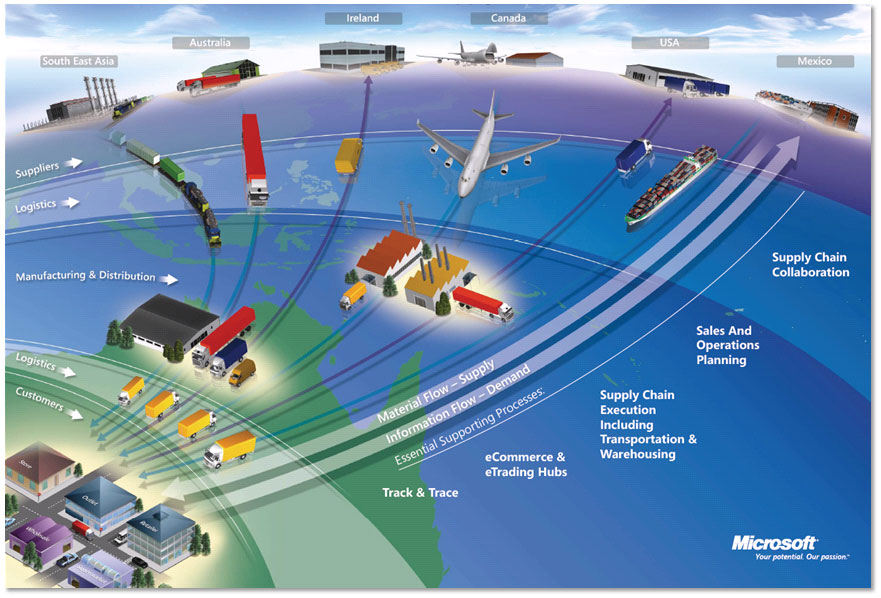Supply Chain Global Governance
The Economist |

By Parag Khanna
Could corporations replace national governments?
Five years since the collapse of Lehman Brothers, the post-financial crisis world has played out quite differently from the dominant narrative of the immediate aftermath. Then it was predicted that globalization could rapidly unravel, export-led emerging markets would slump, and the private sector would be massively re-regulated. Instead, cross-border trade and investment have exceeded 2007 levels, emerging market growth has been robust, and corporations have proven quite nimble in limiting overly onerous regulation.
Still, the world economy is fragile and expectations are high—from governments, the public (“the 99%”), and a growing chorus of shareholders—that companies play a role commensurate with their resources and influence to advance agendas ranging from environmental sustainability to reducing income inequality. The debate has moved beyond clichés about “the market” being necessary to solve all problems towards a more sophisticated approach that I call “supply chain global governance.” This combines the “do no harm” mantras around limiting operational externalities with a proactive strategy to leverage supply chains wherever possible to improve standards and quality of life. I believe that this regime-based approach is likely to replace “corporate social responsibility” in the coming years.
Some of the world’s largest firms have taken notable steps in the direction of progressive supply chain governance. Walmart, the world’s largest retailer, has partnered with the Environmental Defense Fund (EDF) to reduce emissions across its vast footprint of warehouses, distribution centers, and outlets. In May this year it blacklisted almost 250 Bangladeshi factories after the tragic building collapse in Dhaka, sending ripples throughout the garment industry. Apple has worked with the Fair Labor Association (FLA) to identify dozens of improvements in worker safety and other areas now being implemented in Foxconn factories in China. DHL works closely with customs officials in dozens of countries to smooth customs processing, bringing efficiency gains that alone can boost global GDP by 5 percent according to a recent study by Bain Capital.
While examples from the Fortune 100 are numerous, within those same ranks many questions remain such as how this approach differs across public and private firms, and how it will (or will not) scale across state-owned enterprises and SMEs—particularly from the developing world. Some emerging market companies like Petrobras and Vale, both of Brazil, have established solid track records in the sustainability arena, but more opaque Chinese SOEs are far further behind the curve. Then there is the deeper challenge of the incredible complexity of supply chains themselves. The European horsemeat scandal, the tainted New Zealand baby formula in China, and the BP Deep Water Horizon oilrig in the Gulf of Mexico are just several of the major supply chain crises in recent memory. These complex meta-national structures therefore require far more scrutiny and analysis even as we come to rely on them as tools of delivering public goods.
Still, corporations and their supply chains are already critical players in global governance. The highest body in commercial arbitration, for example, is the privately run International Chamber of Commerce (ICC) based in Paris, which simultaneously helps craft collective business positions on international policy issues such as WTO trade negotiations. A nascent effort has begun to apply international humanitarian laws to business actors. The UN Voluntary Principles seek to regulate the activities of corporations operating in zones of conflict. While on the surface this appears to be an example of states strengthening their leverage over corporations, it should instead be viewed as a mutually beneficial process: firms are intimately involved in crafting the regulations, for which the UN is a repository, but its ultimate effectiveness ultimately hinges on the participating companies themselves.
Over the past several years I’ve been involved in the U.S. National Intelligence Council’s Global Trends 2030 process that earlier this year published a major report titled “Alternative Worlds.” It includes a very plausible scenario titled “Non-State World” in which urbanization, technological advance, and capital accumulation accelerate the rise of private players that bend rules to maximize their productive power, particularly through the creation of special economic zones within and across national borders. As the scenario describes this trend, “It is as if the central government acknowledges its own inability to forge reforms and then subcontracts out responsibility to a second party. In these enclaves, the very laws, including taxation, are set by somebody from the outside. Many believe that outside parties have a better chance of getting the economies in these designated areas up and going, eventually setting an example for the rest of the country.”
My only quibble with this fine analysis is that it describes the world of 2013, not 2030. Supply chains, like globalization itself, are a complex system that is a whole greater than the sum of its parts. They are already integral to global governance. Corporate leaders must get accustomed to being CEOs, diplomats and statesmen at the same time.